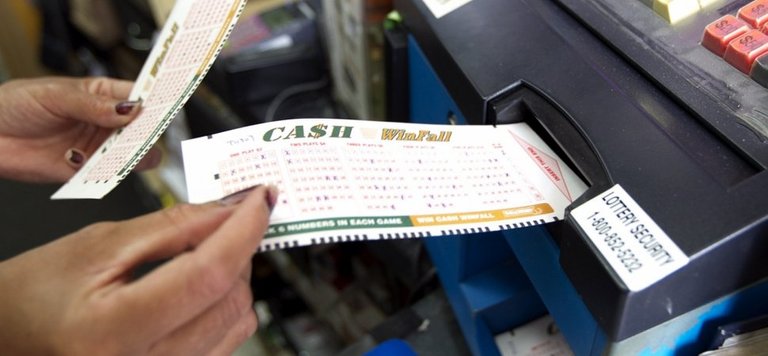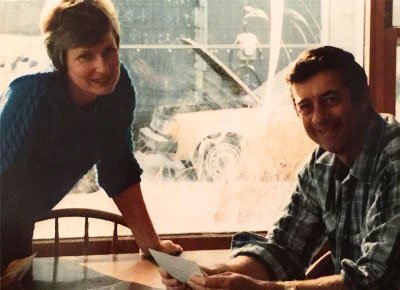The lottery always wins—the odds of winning are minuscule. Yet one retired couple found a way to beat them.

Image source
The lottery: a mug's game
What are the odds of winning the lottery? The usual answer is: vanishingly small. If so, why is it still so popular after hundreds of years?
The basic idea behind a lottery is that some institution, most often a State or government, sells tickets to punters. Part of the funds generated go towards doing something socially constructive like building roads and schools, and supporting welfare, arts, sports and other social activities. The balance is paid back to winning ticket holders. In other words, the lottery always wins.
So why would people accept such incredibly low odds? Perhaps it's seen as a chance to escape poverty. Or the social pressure through advertising is so strong. Or just a gambling addiction. But most likely, it's through ignorance of probability. Whatever it is, when asked, a punter will usually say something like, “If you're not in it you can't win it.” But whatever the reason, people seem to genuinely enjoy playing the lottery.
A curious mind
Not Jerry and Marge Selbee, though. They were not gamblers. They believed in hard work and intelligence. They owned a convenience store in the tiny town of Evart, Michigan.

Marge and Jerry Selbee at their kitchen table in 1974. Image source
It was not by chance that the couple had settled in this remote, cold town. Jerry has a very curious mind and was something of a super-problem solver. Where other people would see a row of cryptic number and letters on a cereal box, Jerry would crack its code for the exact plant, shift, date and time of its creation.
Jerry was intellectually restless and enrolled in many night classes and courses. He pursued each new fascination with vigour. He studied mushrooms, geology (Petoskey stones), string theory, black holes. The list goes on and on.
Jerry worked for Kellogg's and earned an associate’s degree from Kellogg Community College. He got further diplomas: a bachelor’s in mathematics and business from Western Michigan University and an MBA from WMU. He didn't finish his master’s in mathematics—with six kids he simply couldn't find the time.
His curious mind led him to investigate the rolls of coins deposited by bank customers. He presumed that most people don't examine the coins they put into the rolls, and there could well be rare and valuable coins included in them. So he bought up a number of these rolls at face value and would watch TV with his son while they unrolled the coins and checked each one. They made $6,000 from the venture.
In 1984, Jerry decided he was tired of working for Kellog's. So he applied himself to the puzzle of what to do next. He wanted to something for himself and settled on a convenience store. So he put his analytical skills to work, gathering data on such stores for sale across Michigan. He researched the margins of various products and their relation to the demographics of their towns.
Evart was the perfect town. Remote and small as it was, its two auto plants ensured a steady customer base.
The vice business
Jerry and Marge worked hard at The Corner Store. Marge took care of the books and keeping the shelves stocked. Jerry ordered the alcohol and worked tirelessly at figuring out the puzzle of making the maximum money from a convenience store. By studying the various incentives provided by cigarette wholesalers, he even figured a way to undercut the wholesalers and sold cigarettes to other outlets at below cost.

The Corner Store, Evart, Michigan. Image source
He realised early on that installing a lottery machine would add another stream of income to the business. And it was a sure bet since it would be the only one in Evart. And by using the various marketing tricks he had devised he was soon selling $300,000 in lottery tickets per year, with a profit of about $20,000. Over the years, earnings from lottery ticket sales grew and they were able to pay for the educations of their six children, all of whom earned advanced degrees.
Jerry and Marge, now fully into the vices of cigarettes, alcohol and gambling, were themselves non-smoking teetotalers who avoided the lottery entirely. Jerry disliked the sense of risk in playing the lottery, only being interested in the puzzle of the lottery—the set of rules mediated by maths and the marketplace. He knew better than to believe the lottery was ruled by chance. As he later said, “People have been conditioned to think it is luck—they don’t look at the structure of games.”
This will be continued in Part Two, tomorrow
References:
Huffington Post: Jerry and Marge Go Large
Inc.: This Couple Found a Math Error in the Lottery and Made $27 Million (Playing Over and Over for 55 Weeks)
Don't Waste Your Money: This Couple Won $27 Million Using Math To Hack The Lottery
Also posted on Weku, @tim-beck, 2019-01-03
Damn! I had to scroll through a load of Huff Guff just to get to the point of the story.
That's all we needed to know, Huffy!
Spoilsport!
Nice read. Looking forward to the next instalment.
Simply no such thing as easy money, playing lotto's are a waste of time and money.
Spend some time learning how to trade and place effort into self-learning to create extra earnings would be safer.